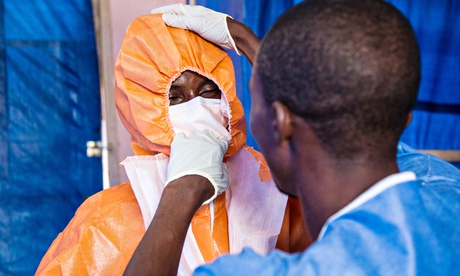
Britain has called on world leaders to “wake up” to the crisis posed by the Ebola outbreak and to follow the example of the UK, US and France in providing medical and financial support to countries in West Africa.
As the UN secretary general, Ban Ki-moon, chided the international community for paying just $100,000 into his $1bn trust fund to fight Ebola, David Cameron called on other countries to “act in a similar way” to Britain, the US and France.
The UK prime minister’s intervention is designed to step up pressure on other EU leaders to agree to increase their contributions to fighting Ebola at an EU summit in Brussels next week. It is felt that Germany could make a greater contribution of cash and medical resources while France has further to go in Guinea to match Britain’s efforts in Sierra Leone.
The criticism from Britain came after Kofi Annan, the former UN secretary general, said he was “bitterly disappointed” with the response of the international community, which would have been different if the crisis had erupted in the west. Annan told BBC Newsnight: “If the crisis had hit some other region it probably would have been handled very differently. In fact, when you look at the evolution of the crisis, the international community really woke up when the disease got to America and Europe.”
Ban Ki-Moon said on Thursday night that countries need to take part in a “huge and urgent global response” to Ebola. He said: “I believe that it is time that those other countries who really have the capacity provide financial support and other logistical support. This is quite serious. We need an urgent global response and support.”
The UN secretary general expressed severe disappointment that only $100,000 has been sent by one country – Colombia – to his $1bn trust fund. A further $20m has been pledged but not received. A wider UN appeal has received $376m, about 38% of the amount the UN is seeking to raise for that appeal.
Speaking at the EU-Asia summit in Milan, David Cameron said: “This is the biggest health problem facing our world in a generation. It’s very likely to affect a number of the countries that are here today. Britain in my view has been leading the way. The action we’re taking in Sierra Leone, where we are committing well over £100m, 750 troops, we are going to be training 800 members of health staff in Sierra Leone, providing 700 beds.
“We are doing a huge amount and I think it’s time for other countries to look at their responsibilities and their resources and act in a similar way to what Britain is doing in Sierra Leone, America’s doing in Liberia, France is doing in Guinea. Other countries now need to step forward with the resources and the action Because taking action at source in west Africa, that is the best way to protect all of us here in Europe.”
Justine Greening, the UK international development secretary, who said Britain had contributed £125m to Sierra Leone, endorsed the prime minister’s comments as she called on world leaders to “wake up” to the crisis. Britain is supporting Sierra Leone because of its historic ties to its former West African colony. The US and France are focusing on Liberia and Guinea because of their own historic ties to the countries.
Greening told BBC Radio 4’s Today programme on BBC Radio 4: “I do think Ban Ki-moon is right to say that many more countries need to get involved. We had the World Bank annual meetings last week in Washington. I was there making those points. I had the chance to meet directly with Ban Ki-moon and we discussed the need for the international community to now step up to the plate.
“It is simply not going to be a tenable approach to simply leave the UK to work with Sierra Leone, to leave the US to work with Liberia, France to work with Guinea and no other countries to get involved. It is fair to say there is now movement. Germany is starting to provide funding. It is quite right to say that the international community now needs to wake up to this crisis and start putting resources into working with the UK and the US in particular to help deliver our strategy which we believe will be successful. We do need resourcing.”
The naval vessel Royal Fleet Auxiliary Argus, with 100 medical beds, will be leaving Falmouth for Sierra Leone on Friday. Capt David Eagles said the beds would not be used to treat Ebola victims in Sierra Leone. He told the Today programme: “Our hospital facility is not for the Ebola patients themselves, but it’s to provide reassurance to the UK military and civilian personnel operating in Sierra Leone in support of the DFID [Department for International Development] mission, that if they have a non-Ebola injury, they will have facilities identical to what they would find in a UK NHS hospital off the shore on UK sovereign territory.
“We also have the ability to screen our personnel returning from duties ashore, so anyone who has been on shore in Sierra Leone will be screened and monitored on their return, and if anybody had inadvertently been in contact with an Ebola patient, we have a process in place that will see them isolated and returned ashore to the dedicated Ebola treatment units in very short order. I’m confident we have a safe system.
“It would serve no purpose to bring Ebola patients out to the ship. The purpose of the DFID mission is to increase the number of Ebola treatment units and Ebola beds and training ashore in Sierra Leone, and as such we are supporting that mission rather than actually using the hospital for Ebola patients. To bring them on board a ship would lead to all manner of complications.”
